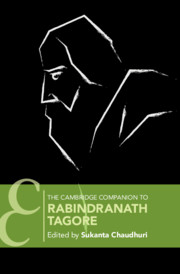Book contents
- Frontmatter
- Contents
- List of Illustrations
- Notes on Contributors
- Preface
- Note on Conventions and Practices
- 1 Rabindranath Tagore: From Art to Life
- 2 A Garland of Many Tagores
- Part I Overviews
- 3 Rabindranath and His Times
- 4 Tagore's Poetry: An Overview
- 5 ‘Something of a Musician’: Tagore's Songs
- 6 Rabindranath Tagore: Drama and Performance
- 7 Imagined Worlds: The Prose Fiction of Rabindranath Tagore
- 8 The English Writings: An Overview
- 9 Tagore and Indian Literature: Influence and Presence
- 10 Rabindranath Tagore and Literary Communication across Borders
- 11 Tagore and the Visual Arts
- Part II Studies
- List of Tagore's Works Cited, with Index
- Further Reading
- General Index
9 - Tagore and Indian Literature: Influence and Presence
from Part I - Overviews
Published online by Cambridge University Press: 24 December 2019
- Frontmatter
- Contents
- List of Illustrations
- Notes on Contributors
- Preface
- Note on Conventions and Practices
- 1 Rabindranath Tagore: From Art to Life
- 2 A Garland of Many Tagores
- Part I Overviews
- 3 Rabindranath and His Times
- 4 Tagore's Poetry: An Overview
- 5 ‘Something of a Musician’: Tagore's Songs
- 6 Rabindranath Tagore: Drama and Performance
- 7 Imagined Worlds: The Prose Fiction of Rabindranath Tagore
- 8 The English Writings: An Overview
- 9 Tagore and Indian Literature: Influence and Presence
- 10 Rabindranath Tagore and Literary Communication across Borders
- 11 Tagore and the Visual Arts
- Part II Studies
- List of Tagore's Works Cited, with Index
- Further Reading
- General Index
Summary
TAGORE: ACHIEVEMENT AND REPUTATION
Rabindranāth Tagore is the most widely renowned writer of modern India. In a career spanning more than six decades, he wrote poems, songs, plays, novels, short stories, essays, memoirs, and travelogues, besides a vast number of letters. He wrote primarily in Bengali, but his writings in English, including self-translations, fill four large volumes. Virtually no other major Indian writer has been so prolific. His Nobel Prize for Literature in 1913 – still the only award to an Indian – was cherished by his compatriots as being, among other things, a validation of India's cultural standing and even a sort of (post)colonial triumph. Tagore became a national icon, one of a trinity together with Mahātma Gāndhi and Jawāharl l Nehru, despite the fact that not only did he not join Gandhi's movement for freedom, but engaged in public controversy with him in 1921. Already in 1917, his lectures titled Nationalism had denounced all forms of nationalism as both selfish and self-destructive.
Such apparent disengagement from worldly issues reinforced his image as a man of transcendent spiritual vision, an impression already generated by his first slim volume in English translation, Gitanjali: Song Offerings (1912), which sufficed to win him the Nobel Prize. In the West, even more than in India, he was seen as a sage and prophet of universal brotherhood, travelling far and wide to preach his message of love and harmony. He seemed to build on and outdo Vivekānanda's pioneering assertion of Indian spirituality at Chicago in 1893. For his admirers, Tagore was not merely a writer, not even only a guru or spiritual guide, but a gurudev, with the aura of a deva or (demi)god. The institution he founded in Santiniketan was at core an āshrama, a holy retreat. He inspired a reverence not remotely commanded by any other writer in modern times unless, like Sri Arabinda (Aurobindo), they acquired an overriding identity as a spiritual leader.
These matters have a bearing on the nature and extent of Tagore's literary influence, which this essay proposes to examine. Tagore wrote numerous works, especially fiction, political essays, and travelogues, which have little overt spiritual content.
- Type
- Chapter
- Information
- The Cambridge Companion to Rabindranath Tagore , pp. 187 - 201Publisher: Cambridge University PressPrint publication year: 2020



